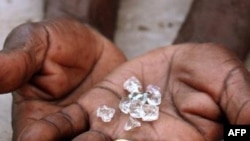The United States participated in the annual Kimberley Process Plenary held in November in Gaborone, Botswana.
The Kimberley Process is an international, multi-stakeholder initiative established in 2003 to prevent the trade of conflict diamonds, defined as diamonds sold by rebel groups or their allies to finance conflicts against legitimate governments. In a statement outlining U.S. views on this year’s Plenary meeting, the State Department praised Botswana, whose bid to host the meeting was supported by the United States, for its “legacy of mining good governance [which] makes it a welcome champion for transparency and accountability in the rough diamond trade.”
The United States, however, has long been a champion of expanding the definition of a conflict diamond. Every person who wears or uses a diamond should be able to rely on the Kimberley Process to certify its origin from sources that respect human rights at all points of the supply chain. The United States will continue to advocate for that expansion.
Another matter of concern at this year’s Plenary was the abuse of the meeting’s consensus-based rules by Russia and Belarus, which blocked participants from discussing the implications of Russia’s war on Ukraine and Russia’s diamond production under the Kimberley Process. The United States and several like-minded countries had sought to include these issues on the agenda. U.S. Principal Deputy Assistant Secretary in the Bureau of Economic and Business Affairs Whitney Baird wrote, “The Russian Federation’s premeditated, unprovoked, and unjustified war against the people and government of a fellow KP [Kimberley Process] member cannot be ignored. The KP must assess Russia’s compliance with the Kimberley Process Minimum Requirements, including the fundamental requirement that no conflict diamonds be exported from its territory.” While discussion of the issue was blocked, Principal Deputy Baird’s letter, as well as letters from other nations, were included in the Kimberley Process’ final Plenary communique.
Finally, the State Department noted that the United States remains gravely concerned with the ongoing conflict in the Central African Republic and the impact on its rough diamond exports. The United States pledged to continue to work with the CAR government to balance the need for legitimate exports with the Kimberley Process mandate to prevent conflict diamonds from entering the commercial supply chain.
The United States is committed to a responsible and sustainable diamond industry and will continue to support the Kimberley Process.
Kimberley Process Plenary 2022

The Kimberley Process is an international, multi-stakeholder initiative established in 2003 to prevent the trade of conflict diamonds, defined as diamonds sold by rebel groups or their allies to finance conflicts against legitimate governments.













